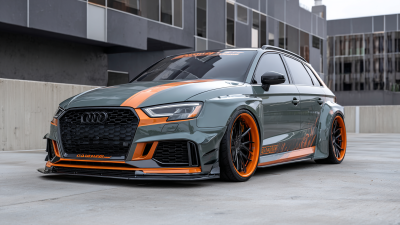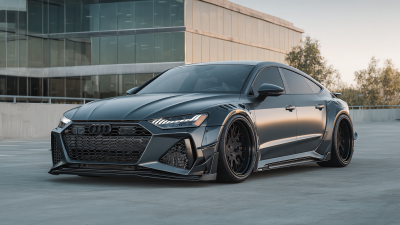
Top Strategies for Sourcing Audi Bodykit for Global Buyers
As global demand for customized vehicles continues to rise, the Audi Bodykit market has emerged as a significant sector within the automotive aftermarket. According to a report by Market Research Future, the global automotive bodykit market is projected to reach USD 1.5 billion by 2023, driven largely by the increasing trend of vehicle personalization among enthusiasts and everyday drivers alike. With Audi's reputation for quality and performance, sourcing high-quality Audi Bodykit options has become increasingly important for global buyers looking to enhance both the aesthetic and aerodynamic aspects of their vehicles. This blog will explore alternative strategies for finding the best Audi Bodykit solutions that cater to diverse buyer needs, ensuring they achieve the optimum blend of performance and style.

Understanding the Audi Bodykit Market Trends for Global Buyers
The Audi bodykit market is constantly evolving, driven by trends that reflect consumer preferences and technological advancements. For global buyers looking to source Audi bodykits, understanding these trends is crucial for making informed decisions. Currently, there is a notable shift towards lightweight materials that enhance performance without compromising on aesthetics. Carbon fiber and fiberglass are increasingly popular, as they not only provide durability but also contribute to fuel efficiency—a significant concern for modern drivers.
Additionally, customization is a dominant trend, with buyers seeking unique bodykits that allow them to express their individual style. Manufacturers are responding by offering bespoke options, giving customers the freedom to choose colors, finishes, and specific aerodynamic features. Furthermore, sustainability is gaining traction, with a growing demand for eco-friendly materials and production processes.
Global buyers should consider these trends when sourcing bodykits, as aligning with consumer desires can lead to greater satisfaction and long-term loyalty. Keeping abreast of these market dynamics ensures that buyers not only meet market demand but also stay ahead in an increasingly competitive landscape.
Identifying Reliable Suppliers in the Audi Bodykit Industry
Identifying reliable suppliers in the Audi bodykit industry is pivotal for global buyers seeking quality and consistency. The increasing demand for customized automotive parts, particularly in premium segments such as Audi, has made it essential to evaluate potential suppliers meticulously. According to a recent market analysis by Research and Markets, the global automotive bodykit market is projected to grow at a CAGR of 5.6% through 2027, highlighting the importance of forming strong partnerships with trustworthy manufacturers.
When sourcing Audi bodykits, it's crucial to conduct thorough background checks on suppliers. Look for manufacturers that have been in the industry for several years and have a proven track record of delivering high-quality products. Additionally, explore supplier reviews and testimonials, which can provide insights into their reliability and service quality.
Tip: Attend automotive trade shows and exhibitions to connect with suppliers and assess product quality firsthand. Another effective strategy is to request samples of the bodykits before placing larger orders, ensuring they meet your expectations regarding material and fit.
Being vigilant about these factors will enhance your sourcing process and help forge long-lasting relationships with dependable suppliers in the Audi bodykit market.

Evaluating Quality Standards and Certifications for Audi Bodykits
When sourcing Audi bodykits for a global audience, evaluating quality standards and certifications is paramount. According to a recent industry report by MarketsandMarkets, the global automotive aftermarket is projected to reach $1 trillion by 2025, underscoring the importance of high-quality parts that meet international standards. It is essential for buyers to verify that any bodykit they consider adheres to certifications such as ISO 9001, which ensures consistent quality management systems, or IATF 16949, specifically tailored for automotive suppliers.
Tip: Always ask for documentation regarding the manufacturer's certifications and quality control processes. This ensures that the bodykits not only meet aesthetic standards but are also safe and durable for vehicle performance. Evaluating the materials used can also reveal a lot about the longevity of the bodykit. For instance, high-grade fiberglass or polyurethane can enhance durability, while poorly manufactured kits might use substandard composites that deteriorate quickly.
Furthermore, engaging with suppliers that participate in recognized industry panels or forums can provide insights into their commitment to quality. According to a study by Frost & Sullivan, companies that regularly engage in quality audits and adhere to best practices significantly outperform their competitors in both durability and customer satisfaction. Reach out to existing clients or seek reviews to gauge the reliability of a supplier's bodykits before finalizing your sourcing decision.

Leveraging Online Platforms for Global Sourcing of Audi Bodykits
In the realm of global sourcing, eCommerce portals play a crucial role for buyers seeking specialized automotive components like bodykits. An eCommerce portal is essentially a digital marketplace that facilitates transactions between buyers and sellers across various regions. This platform not only offers a convenient way to browse and compare products but also enhances accessibility to international suppliers. For buyers of niche items such as bodykits, these platforms enable access to a wider array of options, ensuring they can find the perfect fit for their vehicles.
Utilizing online platforms for sourcing Audi bodykits allows buyers to leverage advanced features like customizable searches and integrated payment systems. This efficiency reduces time spent on procurement while providing detailed product information and customer reviews, fostering informed purchasing decisions. Moreover, as the world becomes more interconnected, the significance of these portals continues to escalate, enabling global collaboration among buyers and suppliers in an increasingly competitive automotive market.
Top Strategies for Sourcing Audi Bodykit for Global Buyers - Leveraging Online Platforms for Global Sourcing of Audi Bodykits
| Strategy | Platform | Advantages | Considerations |
|---|---|---|---|
| Direct Sourcing | Manufacturer Websites | Cost-effective, Authentic Products | Minimum Order Quantities |
| B2B Platforms | Alibaba, TradeIndia | Wide Selection, Global Reach | Quality Verification Required |
| Social Media Marketing | Instagram, Facebook | Engagement with Consumers, Trend Awareness | Brand Reputation Risks |
| Online Marketplaces | eBay, Amazon | Convenience, User Reviews | Potential for Counterfeit Products |
| Networking with Suppliers | LinkedIn, Trade Shows | Building Relationships, Insider Deals | Time-Consuming, Travel Costs |
Establishing Effective Communication with Audi Bodykit Manufacturers
Establishing effective communication with Audi bodykit manufacturers is crucial for global buyers aiming to secure high-quality products.
Research from the Automotive Parts Manufacturers Association indicates that clear communication can reduce misalignment in orders by up to 30%, significantly minimizing delays and additional costs.
It is essential to approach manufacturers with a well-defined project scope, including specifications, quality standards, and expected delivery timelines.
Tips: Always utilize visual aids such as prototypes or detailed schematics when discussing your design ideas.
This practice not only clarifies your requirements but also fosters a collaborative atmosphere, leading to better outcomes.
Another key strategy is to employ consistent follow-ups throughout the negotiation and production processes.
A study by the International Trade Centre highlights that maintaining open lines of communication can improve supplier relationships, leading to preferential pricing and exclusive deals.
Emphasizing transparency in your discussions will also enhance trust, enabling manufacturers to better meet your unique sourcing needs.
Tips: Set a regular communication schedule, whether it's weekly or bi-weekly, to ensure that all parties remain aligned and any potential issues are addressed promptly.
Related Posts
-

7 Stunning Elements of the Best Audi Body Kit for Ultimate Performance
-

Challenges Faced by Global Buyers When Sourcing Audi Body Kits
-

Transform Your Ride: Unique Designs of the Best Audi Body Kits for Global Buyers
-

Harnessing the Advantages of the Best Audi Body Kit for Your Vehicle
-

5 Reasons Audi Body Kit Enhances Your Vehicle's Performance and Style
-

Solutions for Enhancing Vehicle Aesthetics: The Global Demand for Audi Body Kits



